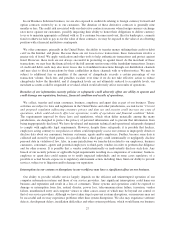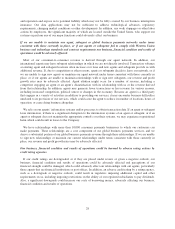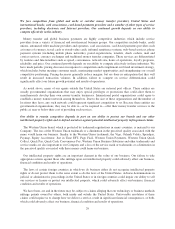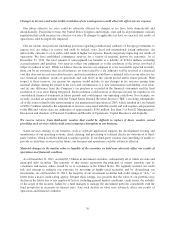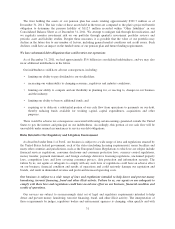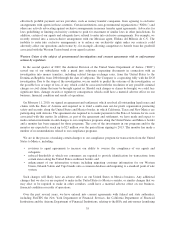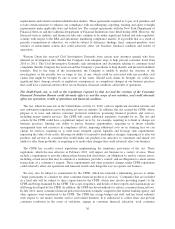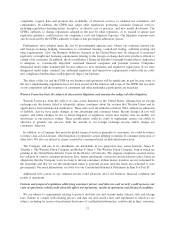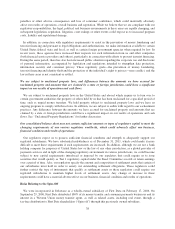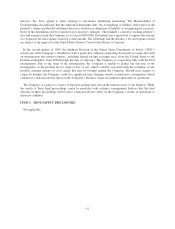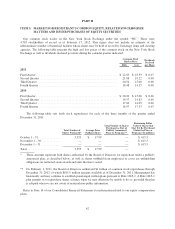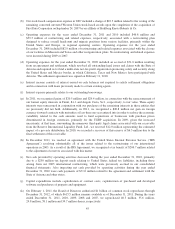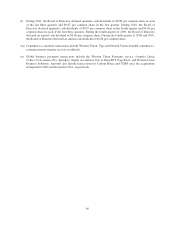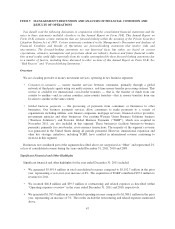Western Union 2011 Annual Report Download - page 44
Download and view the complete annual report
Please find page 44 of the 2011 Western Union annual report below. You can navigate through the pages in the report by either clicking on the pages listed below, or by using the keyword search tool below to find specific information within the annual report.complaints, request data and promote the availability of financial services to underserved consumers and
communities. In addition, the CFPB may adopt other regulations governing consumer financial services,
including regulations defining unfair, deceptive, or abusive acts or practices, and new model disclosures. The
CFPB's authority to change regulations adopted in the past by other regulators, or to rescind or ignore past
regulatory guidance, could increase our compliance costs and litigation exposure. Our litigation exposure may
also be increased by the CFPB's authority to limit or ban pre-dispute arbitration clauses.
Furthermore, rules adopted under the Act by governmental agencies may subject our corporate interest rate
and foreign exchange hedging transactions to centralized clearing, centralized trading, collateral posting and
other requirements. Also, our Business Solutions business in the United States may be subjected to increased
regulatory oversight and licensing requirements relating to the foreign exchange derivative products offered to
certain of its customers. In addition, the Act establishes a Financial Stability Oversight Counsel that is authorized
to designate as “systemically important” non-bank financial companies and payment systems. Companies
designated under either standard will become subject to new regulation and regulatory supervision. If we were
designated under either standard, the additional regulatory and supervisory requirements could result in costly
new compliance burdens that could negatively impact our business.
The effect of the Act and the CFPB on our business and operations will be significant, in part because some of
the Act’s implementing regulations have not been issued and the function and scope of the CFPB, the reactions
of our competitors and the responses of consumers and other marketplace participants are uncertain.
Western Union has been the subject of class-action litigation, and remains the subject of other litigation.
Western Union has been the subject of class-action litigation in the United States, alleging that its foreign
exchange rate disclosures failed to adequately inform consumers about the revenue that Western Union and its
agents derive from international remittances. These suits were all settled in or before 2004, without an admission
of liability, and we have made changes in our advertising and consumer forms. Recent changes in law will
require, and future changes in law or future litigation or regulatory action may require, that we modify our
disclosures or our practices further. These modifications could be costly to implement, restrict our ability to
advertise or promote our services, limit the amount of our foreign exchange income and/or change our
consumers’ behavior.
In addition, as a Company that provides global financial services primarily to consumers, we could be subject
to future class-action lawsuits, other litigation or regulatory action alleging violations of consumer protection or
other laws. We also are subject to claims asserted by consumers based on individual transactions.
The Company and one of its subsidiaries are defendants in two purported class action lawsuits: James P.
Tennille v. The Western Union Company and Robert P. Smet v. The Western Union Company, both of which are
pending in the United States District Court for the District of Colorado. The original complaints asserted claims
for violation of various consumer protection laws, unjust enrichment, conversion and declaratory relief, based on
allegations that the Company waits too long to inform consumers if their money transfers are not redeemed by
the recipients and that we use the unredeemed funds to generate income until the funds are escheated to state
governments. For more information, see Note 6 to our Consolidated Financial Statements in Item 8 of Part II.
Additional civil actions or any criminal actions could adversely affect our business, financial condition and
results of operations.
Current and proposed regulation addressing consumer privacy and data use and security could increase our
costs of operations, which could adversely affect our operations, results of operations and financial condition.
We are subject to requirements relating to privacy and data use and security under federal, state and foreign
laws. Failure to comply with existing privacy and data use and security laws and regulations to which we are
subject, including by reason of inadvertent disclosure of confidential information, could result in fines, sanctions,
37


